介词+关系代词型定语从句中介词的选择
- 格式:doc
- 大小:23.00 KB
- 文档页数:2
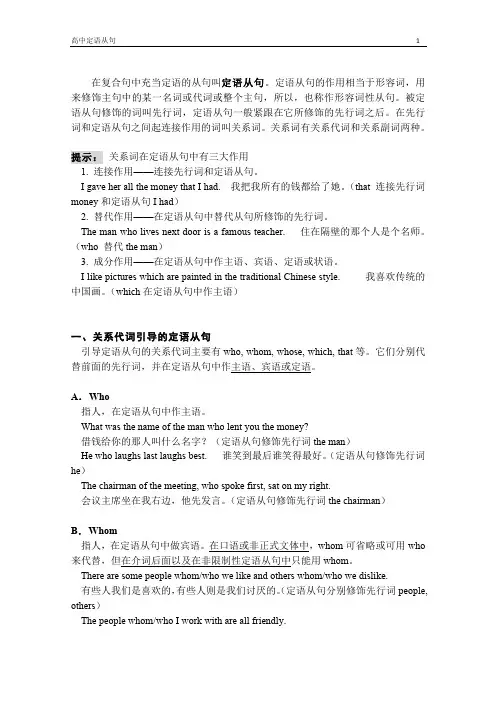

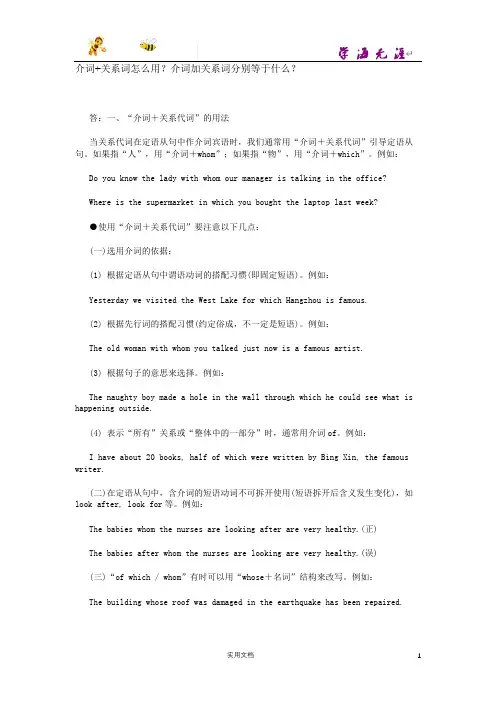
介词+关系词怎么用?介词加关系词分别等于什么?答:一、“介词+关系代词”的用法当关系代词在定语从句中作介词宾语时,我们通常用“介词+关系代词”引导定语从句。
如果指“人”,用“介词+whom”;如果指“物”,用“介词+which”。
例如:Do you know the lady with whom our manager is talking in the office?Where is the supermarket in which you bought the laptop last week?●使用“介词+关系代词”要注意以下几点:(一)选用介词的依据:(1) 根据定语从句中谓语动词的搭配习惯(即固定短语)。
例如:Yesterday we visited the West Lake for which Hangzhou is famous.(2) 根据先行词的搭配习惯(约定俗成,不一定是短语)。
例如:The old woman with whom you talked just now is a famous artist.(3) 根据句子的意思来选择。
例如:The naughty boy made a hole in the wall through which he could see what is happening outside.(4) 表示“所有”关系或“整体中的一部分”时,通常用介词of。
例如:I have about 20 books, half of which were written by Bing Xin, the famous writer.(二)在定语从句中,含介词的短语动词不可拆开使用(短语拆开后含义发生变化),如look after, look for等。
例如:The babies whom the nurses are looking after are very healthy.(正)The babies after whom the nurses are looking are very healthy.(误)(三)“of which / whom”有时可以用“whose+名词”结构来改写。
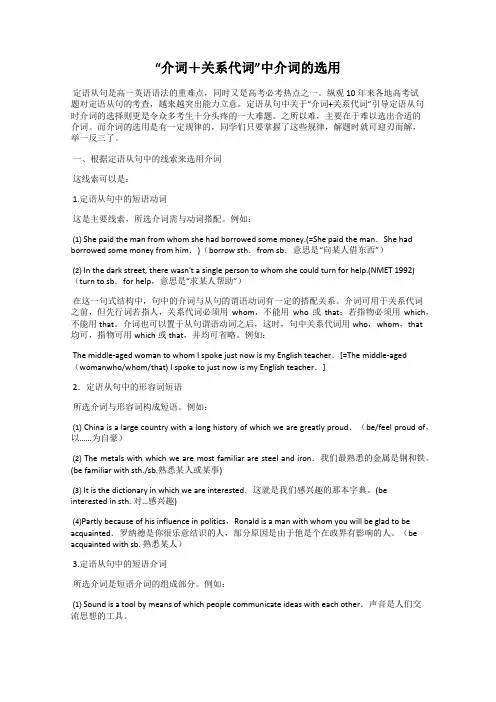
“介词+关系代词”中介词的选用定语从句是高一英语语法的重难点,同时又是高考必考热点之一。
纵观10年来各地高考试题对定语从句的考查,越来越突出能力立意。
定语从句中关于“介词+关系代词”引导定语从句时介词的选择则更是令众多考生十分头疼的一大难题。
之所以难,主要在于难以选出合适的介词。
而介词的选用是有一定规律的,同学们只要掌握了这些规律,解题时就可迎刃而解,举一反三了。
一、根据定语从句中的线索来选用介词这线索可以是:1.定语从句中的短语动词这是主要线索,所选介词需与动词搭配。
例如:⑴ She paid the man from whom she had borrowed some money.(=She paid the man.She had borrowed some money from him.)(borrow sth.from sb.意思是“向某人借东西”)⑵ In the dark street, there wasn't a single person to whom she could turn for help.(NMET 1992)(turn to sb.for help,意思是“求某人帮助”)在这一句式结构中,句中的介词与从句的谓语动词有一定的搭配关系。
介词可用于关系代词之前,但先行词若指人,关系代词必须用whom,不能用who或that;若指物必须用which,不能用that。
介词也可以置于从句谓语动词之后,这时,句中关系代词用who,whom,that均可,指物可用which或that,并均可省略。
例如:The middle-aged woman to whom I spoke just now is my English teacher.[=The middle-aged (womanwho/whom/that) I spoke to just now is my English teacher.]2.定语从句中的形容词短语所选介词与形容词构成短语。
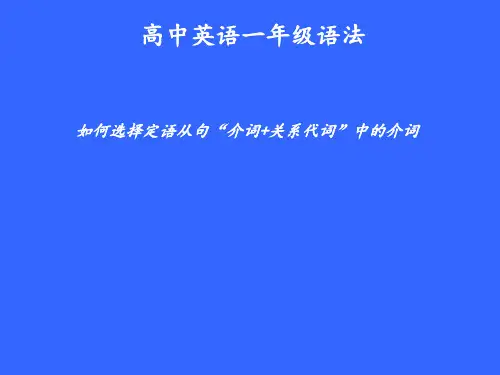
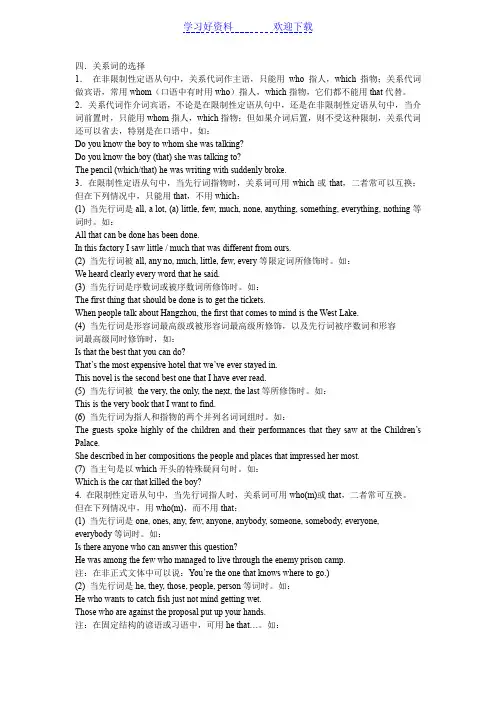
四.关系词的选择1.在非限制性定语从句中,关系代词作主语,只能用who 指人,which指物;关系代词做宾语,常用whom(口语中有时用who)指人,which指物,它们都不能用that代替。
2.关系代词作介词宾语,不论是在限制性定语从句中,还是在非限制性定语从句中,当介词前置时,只能用whom指人,which指物;但如果介词后置,则不受这种限制,关系代词还可以省去,特别是在口语中。
如:Do you know the boy to whom she was talking?Do you know the boy (that) she was talking to?The pencil (which/that) he was writing with suddenly broke.3.在限制性定语从句中,当先行词指物时,关系词可用which或that,二者常可以互换;但在下列情况中,只能用that,不用which:(1) 当先行词是all, a lot, (a) little, few, much, none, anything, something, everything, nothing等词时。
如:All that can be done has been done.In this factory I saw little / much that was different from ours.(2) 当先行词被all, any no, much, little, few, every等限定词所修饰时。
如:We heard clearly every word that he said.(3) 当先行词是序数词或被序数词所修饰时。
如:The first thing that should be done is to get the tickets.When people talk about Hangzhou, the first that comes to mind is the West Lake.(4) 当先行词是形容词最高级或被形容词最高级所修饰,以及先行词被序数词和形容词最高级同时修饰时,如:Is that the best that you can do?That’s the most expensive hotel that we’ve ever stayed in.This novel is the second best one that I have ever read.(5) 当先行词被the very, the only, the next, the last等所修饰时。
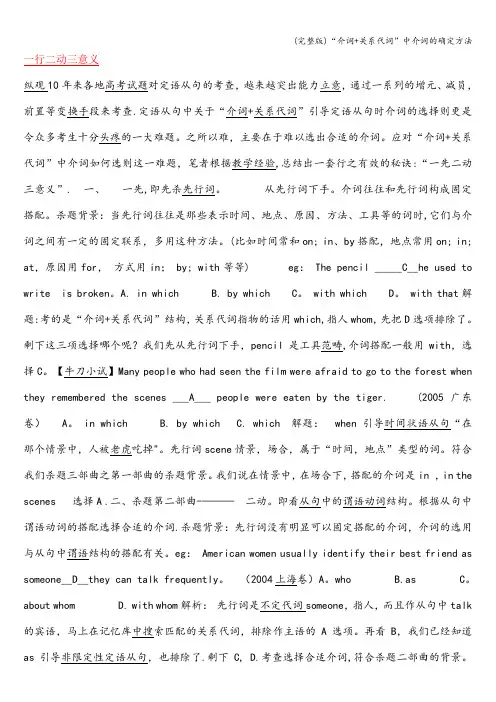
一行二动三意义纵观10年来各地高考试题对定语从句的考查,越来越突出能力立意,通过一系列的增元、减员,前置等变换手段来考查.定语从句中关于“介词+关系代词”引导定语从句时介词的选择则更是令众多考生十分头疼的一大难题。
之所以难,主要在于难以选出合适的介词。
应对“介词+关系代词”中介词如何选则这一难题,笔者根据教学经验,总结出一套行之有效的秘诀:“一先二动三意义”.一、一先,即先杀先行词。
从先行词下手。
介词往往和先行词构成固定搭配。
杀题背景:当先行词往往是那些表示时间、地点、原因、方法、工具等的词时,它们与介词之间有一定的固定联系,多用这种方法。
(比如时间常和on; in、by搭配,地点常用on; in; at,原因用for,方式用in; by; with等等) eg: The pencil _____C__he used to write is broken。
A. in which B. by which C。
with which D。
with that解题:考的是“介词+关系代词”结构,关系代词指物的话用which,指人whom,先把D选项排除了。
剩下这三项选择哪个呢?我们先从先行词下手,pencil是工具范畴,介词搭配一般用with,选择C。
【牛刀小试】Many people who had seen the film were afraid to go to the forest when they remembered the scenes ___A___ people were eaten by the tiger. (2005广东卷) A。
in which B. by which C. which 解题:when 引导时间状语从句“在那个情景中,人被老虎吃掉"。
先行词scene情景,场合,属于“时间,地点”类型的词。
符合我们杀题三部曲之第一部曲的杀题背景。
我们说在情景中,在场合下,搭配的介词是in ,in the scenes 选择A .二、杀题第二部曲-———二动。
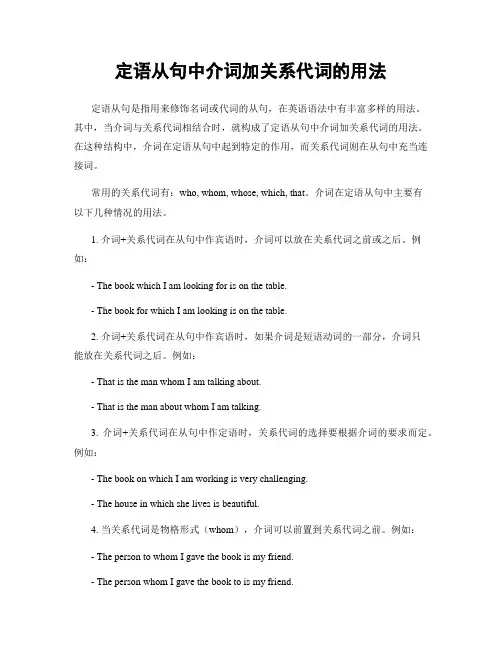
定语从句中介词加关系代词的用法定语从句是指用来修饰名词或代词的从句,在英语语法中有丰富多样的用法。
其中,当介词与关系代词相结合时,就构成了定语从句中介词加关系代词的用法。
在这种结构中,介词在定语从句中起到特定的作用,而关系代词则在从句中充当连接词。
常用的关系代词有:who, whom, whose, which, that。
介词在定语从句中主要有以下几种情况的用法。
1. 介词+关系代词在从句中作宾语时,介词可以放在关系代词之前或之后。
例如:- The book which I am looking for is on the table.- The book for which I am looking is on the table.2. 介词+关系代词在从句中作宾语时,如果介词是短语动词的一部分,介词只能放在关系代词之后。
例如:- That is the man whom I am talking about.- That is the man about whom I am talking.3. 介词+关系代词在从句中作定语时,关系代词的选择要根据介词的要求而定。
例如:- The book on which I am working is very challenging.- The house in which she lives is beautiful.4. 当关系代词是物格形式(whom),介词可以前置到关系代词之前。
例如:- The person to whom I gave the book is my friend.- The person whom I gave the book to is my friend.需要注意的是,在口语中,人们往往更倾向于使用介词后置的形式,即将介词放在关系代词后面。
同时,有时候可以使用介词+which来替代介词+关系代词的结构,这种形式更加简洁。
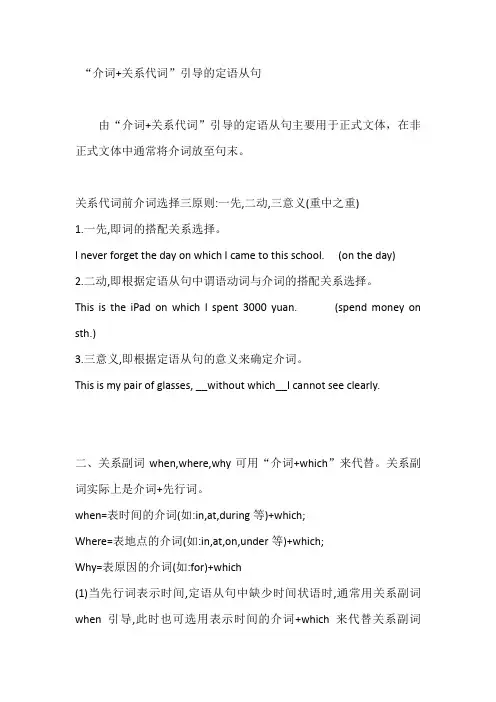
“介词+关系代词”引导的定语从句由“介词+关系代词”引导的定语从句主要用于正式文体,在非正式文体中通常将介词放至句末。
关系代词前介词选择三原则:一先,二动,三意义(重中之重)1.一先,即词的搭配关系选择。
I never forget the day on which I came to this school. (on the day)2.二动,即根据定语从句中谓语动词与介词的搭配关系选择。
This is the iPad on which I spent 3000 yuan. (spend money on sth.)3.三意义,即根据定语从句的意义来确定介词。
This is my pair of glasses, __without which__I cannot see clearly.二、关系副词when,where,why可用“介词+which”来代替。
关系副词实际上是介词+先行词。
when=表时间的介词(如:in,at,during等)+which;Where=表地点的介词(如:in,at,on,under等)+which;Why=表原因的介词(如:for)+which(1)当先行词表示时间,定语从句中缺少时间状语时,通常用关系副词when引导,此时也可选用表示时间的介词+which来代替关系副词when。
I still remember the day when I came here. ( on the day =when)Ocean currents affect the climatesof the lands near which they flow. 海流影响其附近陆地的气候。
DNA:the substance in whichgenetic information is stored.DNA是储存基因信息的物质。
Breeding seasons in animals such as birds have evolved to occupy the part of the year in which offspring have the greatest chances of survival.(剑5,R4,3)含有介词的动词短语一般不能拆开使用如:look for; look after; take care ofThis is the watch for which I am looking.This is the watch which I am looking for.。
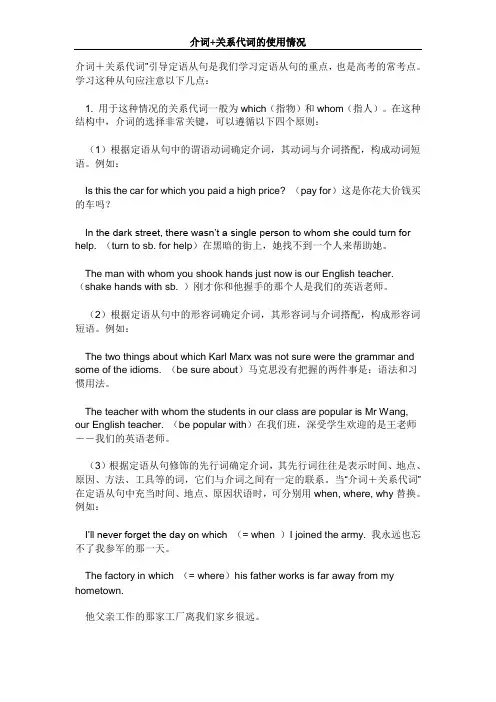
介词+关系代词”引导定语从句是我们学习定语从句的重点,也是高考的常考点。
学习这种从句应注意以下几点:1. 用于这种情况的关系代词一般为which(指物)和whom(指人)。
在这种结构中,介词的选择非常关键,可以遵循以下四个原则:(1)根据定语从句中的谓语动词确定介词,其动词与介词搭配,构成动词短语。
例如:Is this the car for which you paid a high price? (pay for)这是你花大价钱买的车吗?I n the dark street, there wasn’t a single person to whom she could turn for help. (turn to sb. for help)在黑暗的街上,她找不到一个人来帮助她。
The man with whom you shook hands just now is our English teacher. (shake hands with sb. )刚才你和他握手的那个人是我们的英语老师。
(2)根据定语从句中的形容词确定介词,其形容词与介词搭配,构成形容词短语。
例如:The two things about which Karl Marx was not sure were the grammar and some of the idioms. (be sure about)马克思没有把握的两件事是:语法和习惯用法。
The teacher with whom the students in our class are popular is Mr Wang, our English teacher. (be popular with)在我们班,深受学生欢迎的是王老师--我们的英语老师。
(3)根据定语从句修饰的先行词确定介词,其先行词往往是表示时间、地点、原因、方法、工具等的词,它们与介词之间有一定的联系。
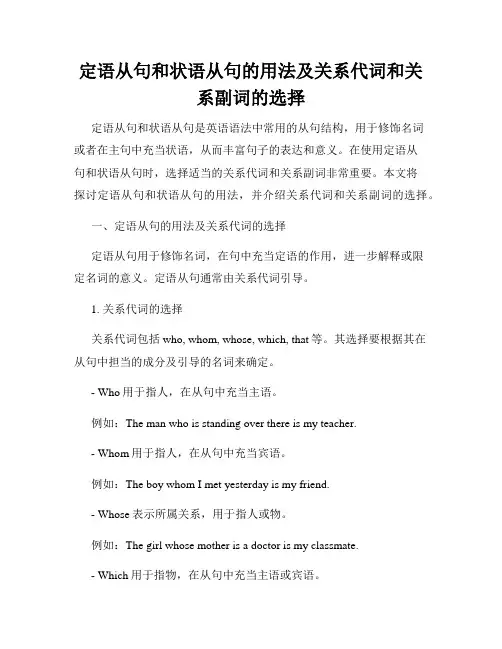
定语从句和状语从句的用法及关系代词和关系副词的选择定语从句和状语从句是英语语法中常用的从句结构,用于修饰名词或者在主句中充当状语,从而丰富句子的表达和意义。
在使用定语从句和状语从句时,选择适当的关系代词和关系副词非常重要。
本文将探讨定语从句和状语从句的用法,并介绍关系代词和关系副词的选择。
一、定语从句的用法及关系代词的选择定语从句用于修饰名词,在句中充当定语的作用,进一步解释或限定名词的意义。
定语从句通常由关系代词引导。
1. 关系代词的选择关系代词包括who, whom, whose, which, that等。
其选择要根据其在从句中担当的成分及引导的名词来确定。
- Who用于指人,在从句中充当主语。
例如:The man who is standing over there is my teacher.- Whom用于指人,在从句中充当宾语。
例如:The boy whom I met yesterday is my friend.- Whose表示所属关系,用于指人或物。
例如:The girl whose mother is a doctor is my classmate.- Which用于指物,在从句中充当主语或宾语。
例如:The book which is on the table is mine.- That用于指人或物,在从句中充当主语或宾语。
它通常用于非限制性定语从句中,表示强调或特定。
例如:My sister has a cat that can catch mice.2. 介词在定语从句中的位置定语从句中的介词通常位于从句末尾。
如果关系代词在定语从句中作介词宾语,则介词须提前。
例如:The house in which they live is very big.The book on which I am working is very interesting.二、状语从句的用法及关系副词的选择状语从句用于在主句中充当状语,修饰动词、形容词和副词等,从而表达时间、原因、条件、目的、方式等不同的语义关系。
关系代词前介词的选择作者:于志芬来源:《高中生·高考指导》2012年第08期在“介词+关系代词”引导的定语从句中,关系代词主要有which,whom,whose,它们既可以引导限制性定语从句,也可以引导非限制性定语从句。
我们应如何选择关系代词前的介词呢?一、介词与从句的先行词是习惯搭配当先行词为时间名词或地点名词(该名词在主句中可充当主语、宾语、补足语、表语或者同位语等)时,我们应根据定语从句所修饰的名词前习惯搭配的介词来确定关系代词前的介词,此时的“介词+which”相当于when或where,在从句中作时间状语或地点状语。
该定语从句既可以是限制性的,也可以是非限制性的。
最常见的表示时间的介词有in,at,on,during,since,by,before,after,until等。
如:例1 Do you remember the day you joined our club?A. on whichB. of whichC. by whichD. at which解析:答案为A。
先行词the day常与on搭配,构成介词短语on the day,在从句中作时间状语,所以用on which引导定语从句。
二、介词与从句的谓语动词是习惯搭配当定语从句的谓语动词为含有介词的动词短语,且先行词在从句中作介词的宾语时,该介词可以移到关系代词之前,构成“介词+which/whom”引导的定语从句。
在含有介词的短语动词中,由于动词和介词的关系比较紧密,一般不能将介词与动词拆开,也不能将介词提到关系代词之前。
这类短语动词有listen to/look at/depend on/take care of/look into/break into/get rid of/look forward to等。
如:例2 Gun control is a subject Americans have argued for a long time.A. of whichB. with whichC. about whichD. at which解析:答案为C。
带介词的定语从句解释
带介词的定语从句是英语语法中比较常见的一种定语从句,它是由介词引导的修饰名词性的从句。
它可以用来修饰名词,在句中作定语,同时还能进一步描述或限定事物的性质、特征、状态等。
以下是详细的解释。
带介词的定语从句的基本结构为:介词 + 关系代词/关系副词 + 句子其他成分。
关系代词包括:whom, whose, which, that, who,关系副词包括:when, where, why。
这里是几个例句:
1. The car in which he came belonged to his father. (“in which”修饰车名)
带介词的定语从句的使用需要注意以下几点:
1.位置:在从句中,介词通常放在关系词(代词或副词)之前,而不是放在后面。
所以,需要我们在写作中注意介词的位置,确保语法正确。
2.省略:在带介词的定语从句中,我们可以省略关系代词或关系副词,只保留介词。
这时,从句中的代词或副词的作用就由先前的名词表示,语法关系不变。
例如:This is the book I was talking about. (about是介词+关系代词,可以省略代词)
3.介词的选择:带介词的定语从句中的介词要与先行词有关。
例如考虑下面的两个句子:
在第一个例句中,介词where指的是她出生的城市,而在第二个例句中,介词in所指的是她现在居住的城市。
因此,介词的意义和使用需要根据具体语境来确定。
带介词的定语从句的使用能够更全面地描述事物,使得句子更加精准、清晰、准确。
因此,在日常写作和口语表达中,我们需要注意引用这种语法结构,并正确使用它。
介词+关系代词“介词+关系代词"引导的定语从句是定语从句的一种复杂形式,这类定语从句的关系代词主要有which ,whom , whose , 它们既可以引导限定性定语从句,也可以引导非限定性定语从句.关系代词前该选用什么样的介词,要根据不同的语境、习语、惯用法等来决定。
一.介词选择的主要标准1.介词与定语从句的先行词是一种习惯性搭配Human facial expressions differ from those animals in the degree to which they can be controlled on purpose.人类的面部表情和动物的面部表情就可控制的程度来说是不一样的。
( to a degree )The gentleman about whom you told me yesterday proved to be a thief.你昨天告诉我的那个绅士被证明是个小偷。
( tell sb. about sb./ sth. )The English play in which my students acted at the New Year’s party was a great success。
那场在新年晚会上我学生参加表演的英语剧很成功。
( in the play )The schools themselves admit that not all children will be successful in the jobs for which they are being trained.学校本身承认,并不是所有的孩子都能在他们所接受的培训的职业成功.( be trained for the job )2.介词与定语从句中的动词是一种习惯性搭配Who is the man with whom our teacher is shaking hands?我们的老师与之握手的那个男士是谁? ( shake hands with sb. )Last month , part of Southeast Asia was struck by floods ,from whose effects the people are still suffering。
介词+关系代词”的用法版本1归纳如下:当关系代词在定语从句中作介词宾语时,我们通常用“介词+关系代词”引导定语从句。
如果指“人”,用“介词+whom”;如果指“物”,用“介词+which”。
Do you know the lady with whom our manager is talking in the office?Where is the supermarket in which you bought the laptop last week?使用“介词+关系代词”要注意以下几点:(一)选用介词的依据:(1)根据定语从句中谓语动词的搭配习惯(即固定短语)。
Yesterday we visited the West Lake for which Hangzhou is famous.(2)根据先行词的搭配习惯(约定俗成,不一定是短语)。
The old woman with whom you talked just now is a famous artist.(3)根据句子的意思来选择。
The naughty boy made a hole in the wall through which he could see what is happening outside.(4) 表示“所有”关系或“整体中的一部分”时,通常用介词of。
I have about 20 books, half of which were written by Bing Xin, the famous writer.(二)在定语从句中,含介词的短语动词不可拆开使用(短语拆开后含义发生变化),如look after, look for等。
The babies whom the nurses are looking after are very healthy.(正)The babies after whom the nurses are looking are very healthy.(误)(三)“of which / whom”有时可以用“whose+名词”结构来改写。
名师语法:“介词+关系代词”引导的定语从句观察下列Reading中的句子:①Have you ever dreamed of playing in front of thousands of people at a concert,at which everyone is clapping and appreciating your music?②They may start as a group of high-school students,for whom practising their music in someone's house is the first step to fame.③Later they may give performances in pubs or clubs,for which they are paid in cash.④They produced a new record in 1996,with which they celebrated their former time as a real band.[自我总结]以上都是“介词+which/whom”引导的定语从句。
“介词+which”用于先行词表示;而“介词+whom”用于先行词指。
【答案】物;人“介词+关系代词”引导的定语从句一、基本用法及关系代词的确定当关系代词在定语从句中充当介词的宾语时,我们用“介词+which/whom”引导定语从句。
先行词指人,用“介词+whom”;先行词指物,用“介词+which”。
My father works in V olkswagen,in which the workers are well paid.我爸爸在大众汽车公司工作,那里的员工待遇优厚。
(in which引导非限制性定语从句,which指物)Zheng Jie is a famous Chinese tennis(网球)player,from whom I learned a lot.郑洁是中国著名的网球手,我从她身上学到了很多东西。
定语从句中介词加关系代词的用法1、当关系代词在从句中作宾语时,介词常常提前,但只能用which或whom。
例如:那所学校他曾经研究过非常有名。
他曾经研究过的那所学校非常有名。
明天我会带来你要求的杂志。
明天我会带来你要求的杂志。
我们将去听我们经常谈论的著名歌手。
我们将去听我们经常谈论的著名歌手。
2、关系副词when。
where。
why和介词+which之间的关系。
关系副词when。
where。
why可以用适当的介词+which来替代,而介词的位置是非常灵活的。
例如:我不会忘记我出生的日期。
我不会忘记我出生的日期。
这是我住过的房间。
这是我住过的房间。
我不知道他今天为什么没来。
我不知道他今天为什么没来。
XXX仍然记得他们住在天津的日子。
XXX仍然记得他们住在天津的日子。
如:The city in which I was born is very beautiful.3.取决于从句中的动词或形容词需要用到的介词。
(V/Adj。
+ pre.)如:This is the person to whom I owe my success。
改写:1.动词短语中的介词一般不可拆开使用,例如“look for”,“look after”,“take care of”等。
例如:This is the watchwhich/that I am looking for.(√)This is the watch for which I am looking.(×)2.若介词放在关系代词前,指人时应使用“whom”,不可使用“who”或“that”;指物时应使用“which”,不能使用“that”;关系代词为所有格时应使用“whose”。
例如:The man with whom you talked is my friend.(√)The man who/that you talked with is my friend.(×)The plane in which we flew to Canada is very comfortable.(√)The plane in that we flew in to Canada is very comfortable.(×)3.“介词+关系代词”前可有some、any、none、both、all、neither、most、each、few等代词或数词。
介词+关系代词
“介词+关系代词”引导的定语从句是定语从句的一种复杂形式,这类定语从句的关系代词主要有which ,whom , whose , 它们既可以引导限定性定语从句,也可以引导非限定性定语从句。
关系代词前该选用什么样的介词,要根据不同的语境、习语、惯用法等来决定。
一.介词选择的主要标准
1.介词与定语从句的先行词是一种习惯性搭配
Human facial expressions differ from those animals in the degree to which they can be controlled on purpose.人类的面部表情和动物的面部表情就可控制的程度来说是不一样的。
( to a degree )
The gentleman about whom you told me yesterday proved to be a thief.你昨天告诉我的那个绅士被证明是个小偷。
( tell sb. about sb./ sth. )
The English play in which my students acted at the New Year’s party was a great success.那场在新年晚会上我学生参加表演的英语剧很成功。
( in the play )
The schools themselves admit that not all children will be successful in the jobs for which they are being trained.学校本身承认,并不是所有的孩子都能在他们所接受的培训的职业成功。
( be trained for the job )
2.介词与定语从句中的动词是一种习惯性搭配
Who is the man with whom our teacher is shaking hands? 我们的老师与之握手的那个男士是谁? ( shake hands with sb. )
Last month , part of Southeast Asia was struck by floods , from whose effects the people are still suffering. 上个月,东南亚的部分地区发生洪水,人们还在遭受着洪水所带来的影响。
(suffer from sth. )
3.介词与定语从句中的形容词构成一种习惯性的搭配
Ours is a beautiful country , of which we are greatly proud . 我们的国家是一个美丽的国家,我们为之感到很自豪。
( be proud of )
The woman to whom Spielberg is married is an actress. 同斯皮尔伯格结婚的女人是一位演员。
( be married to )
The West Lake , for which Hangzhou is famous, is a beautiful place. 西湖很美,杭州以西湖而闻名。
( be famous for )
The woman to whom he was engaged was a doctor. 他与之订婚的那个女士是位医生。
(be engaged to )
4.有时关系代词前用什么介词,要根据句子的意思来决定,此时不但要注意其前的搭配,也要注意其后的搭配
I was a woman running toward me in the dark. Before I could recognize who she was, she had run back in the dark.Before I could recognize who she was , she had ran back in the direction from which she had come.看见一位妇女在黑暗中像我走来,我还没来得及认清她是谁,她已经从她来的方向跑回去了。
(如果仅注意先行词,很容易受习惯心里的影响而使用in this direction 的搭配,但考虑到语境后的come ,则应该使用from。
)He was educated at the local high school, after which he went on to Beijing University. 他在当地一所高中上学,之后他上了北京大学。
(after which 的意思就是“在当地一所高中接受完教育之后”)。
In the office I never seem to have time until after 5:30 pm. by which time many
have got home.在办公室我好像总是没时间,只有等到下午五点半,而那个时候大家都已经回家了。
(此句不能受at 5:30 pm 的通常表达的影响而选用介词at, 而应该依据整个句子的语意来确定介词。
)
5.表示“所有格”或“整体与部分关系”时,用介词of
The journey around the world took the old sailor nine months, of which the sailing time was 226 days.这次环球旅行老水手用了9个月,其中航行的时间是226天。
The factory produces half a million pairs of shoes every year, 80% of which are sold abroad. 这个工厂每年生产50万双鞋,其中的(指50万双鞋)80%销往海外。
I was told that there were about 50 foreign students studying Chinese in the school, most of whom were from Germany.我被告知这个学校有大约50个外国学生在学习中文,其中大多数来自德国。
I have many friends,of whom some are businessmen. 我有很多朋友,其中有些是生意人。
二.介词不能提前的情况
当关系代词在定语从句中作介词的宾语时,介词可以提前放在which(指事物不能用that)或者whom(指人不能用who)之前,也可放于原来的位置,但在含有介词的动词固定短语中,由于动词和介词的关系比较紧密,一般不能将介词与动词拆开而将介词提到关系代词之前。
这类短语动词有listen to/look at/depend on/take care of/look into/break into/get rid of/look forward to等。
This is the room which/that Lu Xun used to live in.(=This is the room in which Lu Xun used to live.)这是鲁迅曾经住过的房间。
The man。